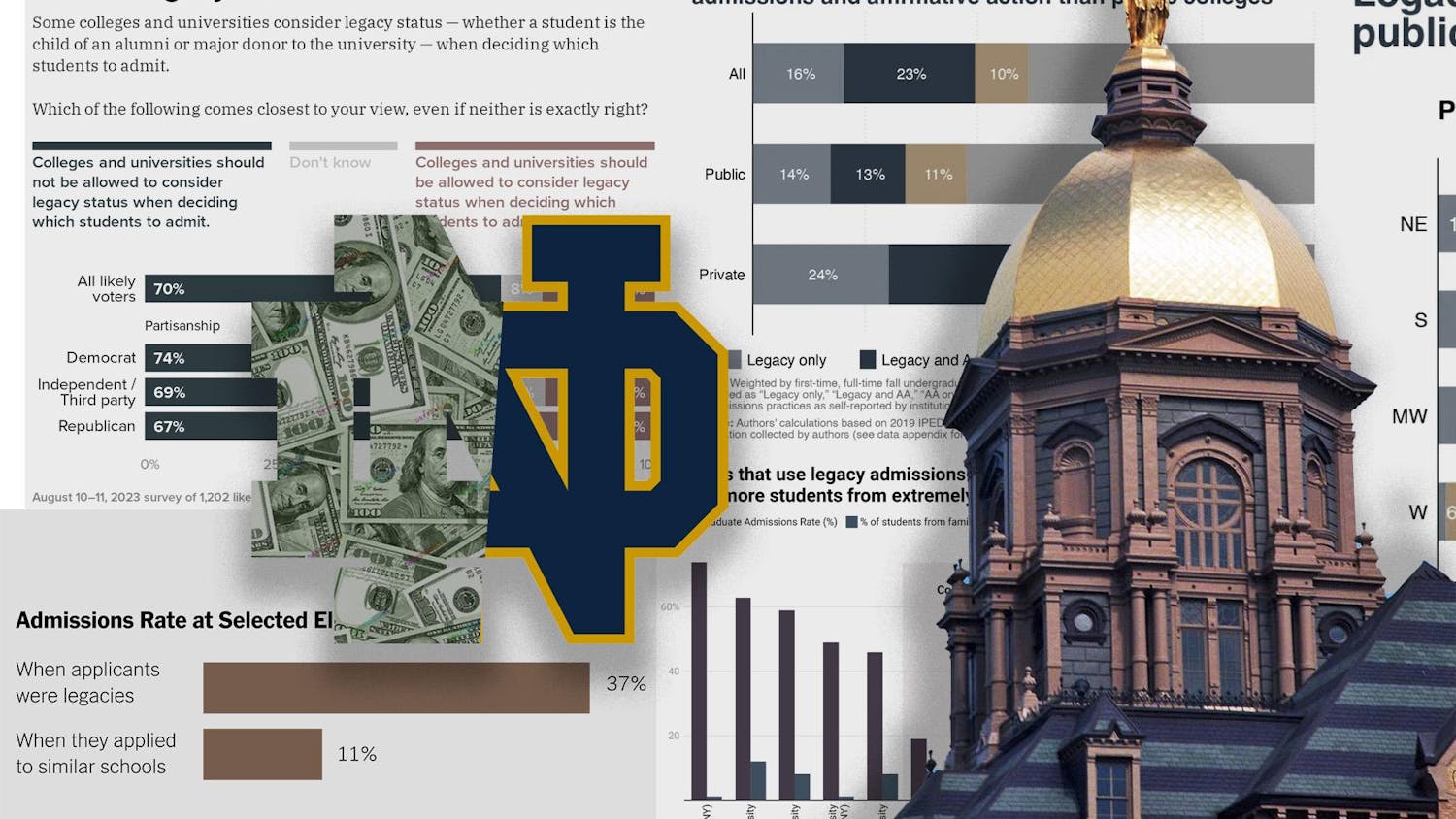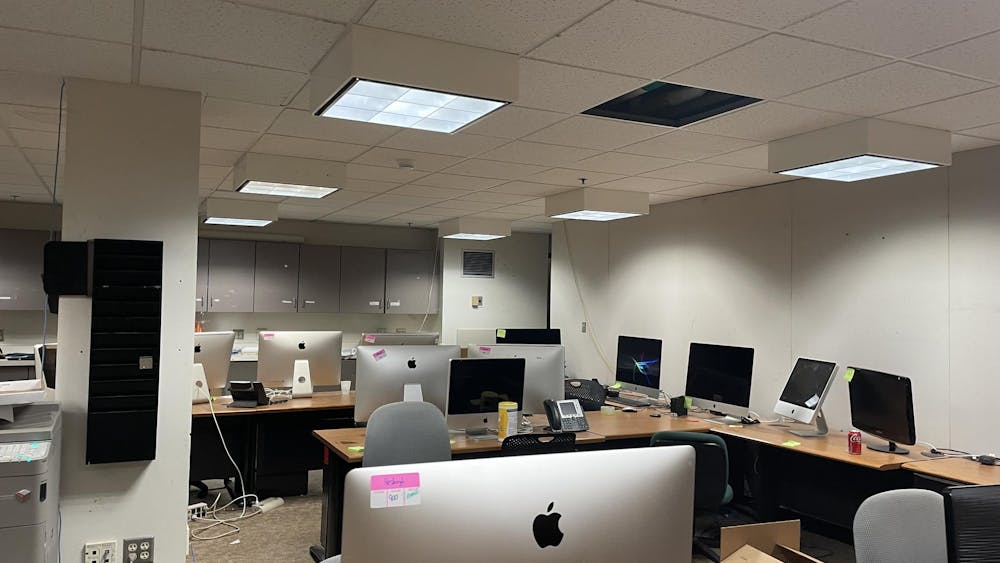It’s that time of year again. Time for someone to write the good ol’ “Notre Dame is Catholic and its Catholicism makes it valuable and unique, which means its LGBT students better suck it up and shut up” letter to the editor.
Surely, as has happened before, upon reading this, an LGBTQ+ person will write an article in response, arguing that precisely because the Universityis Catholic, it has an obligation to welcome and defend its most vulnerable members; this is because of the preferential option for the poor, because of the fundamental equality of human dignity, because of solidarity or because of any number of principles of Catholic tradition.
The University will not change. The University, pending an “apostasy,” will continue to, on paper, adhere to official Church teaching on matters of human sexuality. The University will continue to offer certain limited speaking opportunities to those who disagree with the Church’s teaching, continue to allow the existence of LGBTQ+ friendly organizations and continue to refuse to condemn LGBTQ+ students, faculty and staff outright. There will continue to be Observer letters making every LGBTQ+ person on this campus feel like they were just hit in the face with a brick. The Observer will continue to publish these letters. The Observer will also publish the responses to these letters.
Aren’t you tired of it? I know I am.
I am a Roman Catholic, Mass-attending, baptised-confirmed-
I have grown enormously during my time here. I have had loving, beautiful relationships with women that have inspired me to love God more, to be kinder, to grow in wisdom, prudence, temperance, fortitude, faith, hope and all the other virtues as well. I have learned about myself, matured, learned to love another person and learned how to go on dates. I went to a dance for the first time in an outfit I actually liked with someone I actually liked.
It hasn’t always been easy.
In case anyone was in my dorm at 4 a.m. sometime my freshman year and noticed me crying in the chapel, it was about being gay. In case anyone has seen me with my head in my hands during Mass, it was about being gay. In case anyone knows that I broke up with someone I loved very much at the start of my time here, it was because I couldn’t believe that God would allow me to love a woman in that way. In case anyone watched me practice reciting Hopkins’ “Carrion Comfort” in another dorm chapel or praying the rosary in the dark, it was because I was working through God and my relationship, our strained and tried relationship. I have loved the Church, I have been prayed over by people who professed to be able to heal me from my “affliction,” I have been to a Matt Maher concert and fervently tried to believe that celibate love will hold us together, and I have hated the Church.
The turning point in the dark night of my soul was one day in the midst of prayer — same topic as always — and I suddenly laughed to myself and wondered, “What do straight people pray about?”
I realized the obvious. My entire spiritual life had become dominated by one issue. And I let myself believe, for 10 seconds at first, that God didn’t actually ask this sacrifice of me. What if he didn’t plan for me to be alone forever? Then I let myself think this for 30 seconds. Then for a minute. And I considered what Christianity was about, then, if not lifelong celibacy. The freedom and peace that washed over me felt like God’s sigh of relief.
Dear straight people: Help me! What DO you pray about? What do you confess? Do you feel safe when you receive the eucharist? What sacrifice could God possibly be asking of you? How do you know what vices to prune? What virtues are you trying to cultivate? What theology do you read? What do you think about the cross? How do you love Jesus?
For the first time, I found myself standing in the shoes of someone who God did not ask to sacrifice one of the most fundamental manners in which they relate to other people. For those who are unfamiliar, being LGBTQ+ isn’t all about sex; it’s about the crush you have in kindergarten on a girl from across the playground, it’s about feeling uncomfortable in a locker room with other boys because you don’t want them to think you’re predatory, it’s about being a little afraid your whole life that someone will find out your secret, it’s about your grandma asking if you have a boyfriend yet, it’s about the waiter flirting with you, it’s about the button-down shirt I wear to class, it’s about the deep and abiding affection I feel for my best friend. Every small moment that connects to gender or romantic attraction is affected. Pardon me if I don’t believe you when you say that “being gay” is alright, while “acting on it” is a sin. How am I supposed to not act gay when I am? How is it that my nature, which is not evil, has an end which is evil?
I’m not oversimplifying the argument, I promise; I’ve read Thomas Aquinas too. I simply believe that those who make that argument are oversimplifying my lived experience and are failing to understand the complexities and realities of what it means to live as an LGBTQ+ person.
If you can, try to imagine standing in my shoes. Imagine, for a moment, that everything was different for you and wonder what your life would have been like if you were like me.
I know the Church is supposed to be unchanging and the University has its principles. Not long ago, I believed the same principles. I understand all the philosophical rigor in the world cannot be bent by the pathos-ridden argument of a young woman. However, if you, reader, truly believe that Catholicism is inseparable from heteronormativity, that heteronormativity is built into the Church’s framework like the pillars holding up Notre Dame de Paris’ spire, please know this: once, I believed that too. And that belief almost destroyed me. So every time someone argues that their opposition to LGBTQ+ inclusion is a pure, holy, objective belief that they have a right to have and that I ought not to take it personally, please know I am absolutely taking it personally because it is personal. It concerns my deepest self and the largest struggles I have faced in my life. And on a purely objective scale, the average Catholic just hasn’t thought as long and hard about it as I or many of my LGBTQ+ siblings in Christ have.
This University is Catholic, and it always will be. But so am I. God willing, I will be Catholic until the day I die. And I am tired of having my existence and inclusion in a Catholic place debated as though it were a fun topic in a high school theology class. The lives of real human beings like me are affected every time we allow hatred and exclusion in our Church, in our parishes, in our universities and in our schools. Please, in the name of gentleness and mercy, if you, reader, are still opposed to LGBTQ+ inclusion in the Church, choose your words carefully and remember that there are real, complicated, dignified, made-in-God’s-image people hearing them, people that you haven’t witnessed in prayer, people that have been wounded by the Church, people that love God, people who have wept and wept about their place in God’s kingdom, people who will be far more affected by your words about gay rights than you will ever be. Lastly, as the Psalmist pleads, so I beg: may the Lord take away your hearts of stone and give you natural hearts.
But trust me, I used to agree with you. I feel empathy for you. Can you feel empathy for me?
Maddie Foley
junior
Sept. 18









